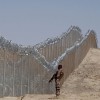Indian State Should Focus on Unconventional Methods: Jamal Nasir Baloch
Balochistan issue: Bajwa phones Baqeri and begs his help to deal with Baloch militants

QUETTA: The Pakistan Army spokesman Inter-Services Public Relations (ISPR) confirmed that Pakistan’s Chief of Army Staff General Qamar Javed Bajwa has telephoned Maj Gen Mohammad Baqeri, Chief of the Iranian Armed Forces, to discuss various issues.
According to ISPR, General Qamar Javed Bajwa has expressed concern over an attack on Pakistani security forces along the GoldSmid line (Iranian border) on Friday.
Six Pakistani soldiers including a Major rank officer, Nadeem Bhatti, were killed in the remote-controlled IED attack.
“The military chiefs of Pakistan and Iran have agreed to tighten security on both sides of the border,” ISPR statement claimed, adding that on the occasion, Army Chief General Qamar Javed Bajwa said that Pakistan has started installation of the fence on the border with Iran.
Bajwa reportedly stressed on mutual co-operation to ensure border security and to counter smuggling.
The Voice of America reported that General Bajwa said effective measures were needed to curb the movement of terrorists and drug smugglers.
The two military leaders also discussed various measures to prevent the spread of the coronavirus and border terminals.
According to ISPR, the Pakistan Army Chief reiterating his desire for regional peace and stability said that Pakistan wanted peace on the basis of mutual dignity, non-interference and equality.
Previously also Pakistan discussed cooperation against Baloch pro-freedom forces with Iran several times and at times even blamed Iran for supporting what it calls ‘terrorism’ in Pakistan occupied Balochistan.
The Pakistani military has begun installing a 1000-kilometre fence along the GoldSmid Line (Iranian border) which both countries claim is aimed at tightening security on both sides.
Pakistan claims that pro-freedom Baloch move to Iran after attacks in ‘Pakistani territory’ Eastern part of Balochistan.
Pakistan’s armed forces say that due to the difficult terrain it is not possible for Pakistan to fully monitor the 1,080 km long border.
Hence, Pakistan has decided to erect a similar fence on the Iranian border that they have erected on the Afghan border.
“Besides the installation of 1080 km long fence on the border, 215 border forts will also be built and a surveillance system will be installed”, ISPR claimed in its statement.









